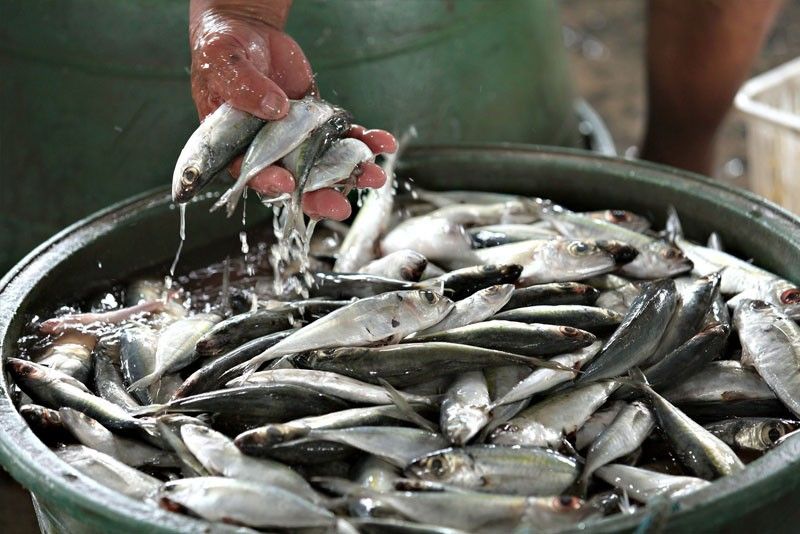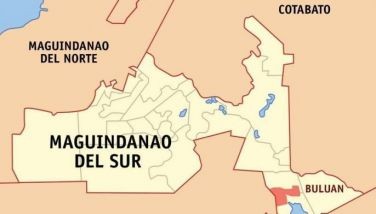Fishers ask Emmanuel Piñol to withdraw galunggong import plan

MANILA, Philippines — An opposition lawmaker yesterday blocked the proposal of Speaker Gloria Macapagal-Arroyo to import fish — galunggong or round scad in particular — as part of efforts of the Duterte administration to temper inflation.
The fisherfolk group Pambansang Lakas ng Kilusang Mamamalakaya ng Pilipinas (Pamalakaya) also “humbly appealed” to Agriculture Secretary Emmanuel Piñol to withdraw his approval for the importation of 17,000 metric tons of galunggong starting first week of September, in a bid to suppress rising fish prices.
“It is a band-aid solution that does not really address the problem of falling fish production. It is a miserable supply side intervention,” Buhay party-list Rep. Lito Atienza, a senior deputy minority leader in the House of Representatives, said.
The 17,000 metric tons of imported round scad are expected to have a landed cost of P75 to P80 per kilo and would be sold directly in local wet markets to help stabilize fish prices, the DA said.
“What difference will 17 million kilos of galunggong make? That is just equal to 17 million households consuming one kilo each in a day. Ubos na iyan sa loob ng isang araw lang,” Atienza predicted.
“The best way for the government to fight off rising fish or food prices for that matter is by enabling the production of more fish and more food,” he said.
Historically, Atienza said other countries that produce large food supplies tend to have relatively stable inflation rates, regardless of the price of crude oil – whether it is $50 or $100 per barrel.
Inflation soared to a fresh five-year high of 5.7 percent in July, mainly due to food and non-alcoholic beverages posting a 7.1 percent annual rate of increase.
Consider small fisherfolk
Pamalakaya, in a statement, said “for the sake of the safety of the Filipino public and the livelihood of small-fisherfolk,” the DA should withdraw its importation order and instead focus on promoting the local agricultural production including fisheries.
“The Filipino public has spoken; we are alarmed by the high possibility that imported galunggong from China may be contaminated with formalin, a chemical primarily used to preserve cadavers,” Pamalakaya chair Fernando Hicap said.
“But most of all, we fear for the negative effect that this importation will pose to the livelihood of Filipino fisherfolk,” Hicap added.
The group insisted that abundance of imported fish will not guarantee that inflation would be arrested “as few consignations and traders still control the price in the market and farm gate prices.”
Pamalakaya blamed the local shortage of fish on existing fishery policies of the government as well as the “bulungan” practices in fish ports where middlemen control prices.
“What is needed is for the government to boost and develop the capabilities of local fishers and ensure post-harvest facilities against spoilage of harvested fish,” Hicap stressed.
Pamalakaya vowed to campaign for more public support in plans to boycott imported galunggong and other marine and aquatic products.
Rice crisis and high prices
The Department of Trade and Industry (DTI) was urged yesterday to step up its monitoring of prices of goods in the wake of reported high prices of rice in Zamboanga City and other parts of Mindanao.
In making the appeal, Davao City Rep. Karlo Nograles, who chairs the House of Representatives appropriations committee, said it is possible that traders are resorting to profiteering.
“Particularly vulnerable are areas located far from urban centers. The farther retailers are from the wary eyes of government, the greater the possibility that heartless businessmen will try to exploit consumers,” he said.
He said the government should “send a message that profiteering does not pay.”
“The government must make it clear that if businesses try to illegally pad their profits, they will literally pay for their crimes,” he said.
He noted that the DTI has warned profiteers that they could face a P1-million fine. Nograles urged the agency to be “extra vigilant especially since rural folk’s budgets are hurt the most when the prices of basic goods go beyond the DTI-suggested levels.”
At the same time, he asked the public to report establishments selling goods at prices higher than the DTI-prescribed suggested retail price (SRP).
“We all know that this is DTI’s job, but this is one task everyone can help with. The SRPs of basic goods are in the DTI website. If we notice that a store is not following this standard, then report it,” he said.
On Wednesday, Nograles reported the rice prices in Zamboanga City and other parts of Mindanao have shot up to P55 to P70 per kilo.
He said this was P13 to P28 more than the national average of P42 as reported by the Philippine Statistics Authority.
As this developed, the DTI and the DA have agreed to allow the trade department to issue notice of violation to wet market vendors who refuse to bring down pork and chicken prices to reflect lower farm gate prices.
The DTI will also be going after traders providing supply to wet market vendors.
Trade Secretary Ramon Lopez told reporters, the DA has agreed to allow the DTI to issue notice of violation to wet market vendors found selling at high prices without waiting for the agriculture department.
He said farm gate prices of pork and chicken have gone down, and such should be reflected in retail prices in wet markets.
In particular, he said the farm gate price of chicken has gone down to P80 from around P90 to P98 previously, while retail prices are still at P140 to P150.
He said the retail price should now be at P130.
Meanwhile, the DA said consumers can expect lower prices of red and white onions in the next two weeks as it decided to lift the special safeguard (SSG) duties imposed on the two commodities.
Piñol said importers asked to give them two weeks to implement the reduction of prices in the market.
White onion, which currently sells at P120 per kilogram, will be sold in retail stores at P55 per kg. – With Jess Diaz, Louella Desiderio, Louise Maureen Simeon
- Latest
- Trending





























